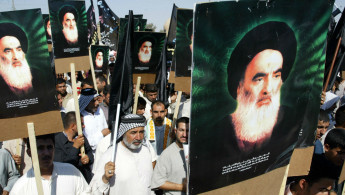Don't re-elect 'corrupt' MPs, says Iraq's top Shia authority
Iraq's highest Shia authority, whose opinions carry great weight in the country, urged voters not to re-elect "corrupt" MPs during next week's national elections, reports said on Friday.
Abdel Mehdi al-Karbalai, the representative of Grand Ayatollah Ali Sistani, issued the call during weekly Friday prayers in the holy city of Karbala.
He said Iraqis who will vote in the May 12 polls should not re-elect candidates from among MPs and officials who have already held government jobs and proved to be "corrupt and failing".
Karbalai said voters should "avoid falling into the trap of those who want to fool you", including "those whom you have known" - a reference to outgoing MPs and other officials running in the polls.
Political analyst Aziz Jaber said Karbalai's remarks targeted "heads of lists who have held government jobs and MPs such as vice-presidents Nouri al-Maliki and Ayad Allawi".
Prime Minister Haider al-Abadi - accused by critics of failing to tackle rampant corruption in Iraq - heads one of the main lists and hopes to be re-elected.
Shia religious parties have come to play a greater role in the years since the 2003 US-led invasion that toppled dictator Saddam Hussein.
Sistani, whose opinions are widely respected among Shias, mobilised tens of thousands of men to join paramilitary units of the Hashed al-Shaabi, which played a crucial role in defeating the Islamic State group in Iraq.
More than 24 million Iraqis are registered to elect 320 deputies from a field of around 7,000 candidates on May 12, with 71 seats reserved for the capital.
According to the electoral commission, only 20 percent of the candidates are newcomers. Iraq's last parliamentary elections were held in April 2014, which saw Maliki's Shia-dominated party win and form a coalition with smaller parties.
Iraq is ranked the 12th most corrupt country in the world by Transparency International.
In February, Iraq sentenced a former trade minister to 21 years in jail for corruption, weeks after Interpol handed him to authorities.
Abdel Falah al-Sudani, who served as trade minister following the 2003 US-led invasion that toppled dictator Saddam Hussein, was handed two seven-year sentences for "negligence" by an anti-corruption court.
He was also sentenced to seven additional years for misconduct, bringing the total to 23.





 Follow the Middle East's top stories in English at The New Arab on Google News
Follow the Middle East's top stories in English at The New Arab on Google News
![The UAE is widely suspected of arming the RSF militia [Getty]](/sites/default/files/styles/image_330x185/public/2024-11/GettyImages-472529908.jpg?h=69f2b9d0&itok=Yauw3YTG)
![Netanyahu furiously denounced the ICC [Getty]](/sites/default/files/styles/image_330x185/public/2024-11/GettyImages-2169352575.jpg?h=199d8c1f&itok=-vRiruf5)
![Both Hamas and the Palestinian Authority welcomed the ICC arrest warrants [Getty]](/sites/default/files/styles/image_330x185/public/2024-11/GettyImages-2178351173.jpg?h=199d8c1f&itok=TV858iVg)